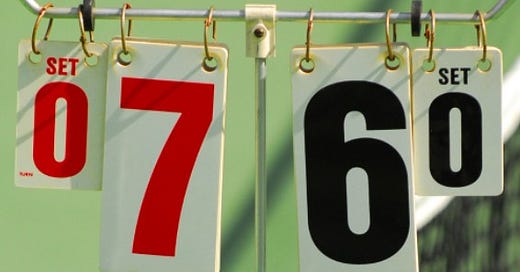Gladiators VII
The father did not know the origin of his early precision that morning, valid not only for the service but for the backhand, too.
“Want to keep the stats, buddy?” said the father to the boy. This was not a question. The boy slid the pencil from the coil, opened the pad, waited for something to record.
The father’s serve over those Sundays was often good out of the box, immediately amenable to his whim. He quickly adjusted according to where Krinky set up to receive, then put in the right spin and speed to stitch Krinky to his spot. Any new notion or technique—those maxims returning over the years from playing with his father in Tucumán—all made themselves natural once woven into his motion. The father let his mind wander and it would return with the memory of turning his toes to the target. He also allowed his forward hip to protrude into the court and called down a power that Krinky could only bunt away. Then, perhaps owing to passing cloud, a change in the light, the dry creak of a crow, a breeze through the maples, a passing train, the smell of the clay in Tucumán, or some other invasive thought, his stroke would take a dip, degrade, depart his body beyond even brief revival. Had Johnny Carson meant him, not-Nils, when he had said “Here comes the fisherman?” What could that mean? The father would frame a ball away, the exalted error of its arc tracked by a waiting gypsy. The boy in the tribune made a hash mark in the margin of a page already becoming congested with sketches of aircraft. Should his father lose, the boy had already decided, he would refuse to play pattycake in the lot to pass the time. Already, he had decided to retain the notebook come what may. From instinct the boy hunched over in order to hide his work from Grycz, sitting on the tribune just above.
The father did not know the origin of his early precision that morning, valid not only for the service but for the backhand, too. Had his non-dominant hand carried the racquet into early preparation? Surely. Did he delay the tossing hand aloft long enough that his shoulders became those of a ready volunteer for heaven, just waiting to be drawn up? Oh well, he supposed, everything falls into order with sufficient sleep. He had slept well but found he did not know the score. Whatever Krinky called was fine for him. Krinky approached the net to speak with him--or so the father thought—only to discover it was time for the changeover.
“What’s bothering you?” said Krinky, coming sharply around the post, irritable about losing a break.
Jugs then sat up as if someone had called his name. His mask remained a sealed, suffocating bellows.
“Jesus wept,” said Krinky, looking at Jugs.
“Stay down Jugs,” said Grycz through his own mask. “You look like you could use it.”
“You. Are. Barely. Scratching.” huffed Jugs, presumably to Krinky, who had choked up on his racquet again to better abuse a Wilson on his way to the service line.
The father found Jugs’s eyes above the mask.
“Bonjour,” said the father, as if to a hiding child.
The boy, for his part, was wondering what he looked like while sitting in the tribune marking down shanks and aces and the bad words that went with them. A shank had a certain sound. He had settled on what he thought was a serious expression, modeled on the one worn by Krinky. His father’s was too diffuse, almost absent. If spoken aloud, alone—especially if it came with force--any word was bad to the boy. Whenever his father said “sugar” the boy knew he meant something else. The boy marked it anyway. Intention, to the boy, mattered more than form. His worries, in any case, were absorbed by the notion he had rendered the wingtips of the A380 poorly. His hand sneaked away to his kangaroo pocket for another feel of the metal model. He felt the taper of the model’s wingtips, but withdrew unsure. He thought maybe this page of his father’s notebook might not withstand another erasure.




